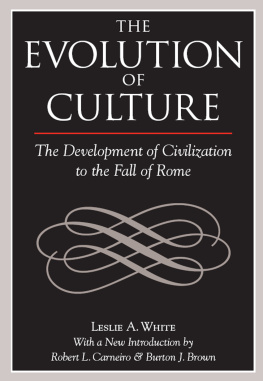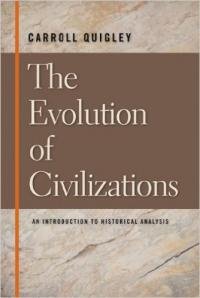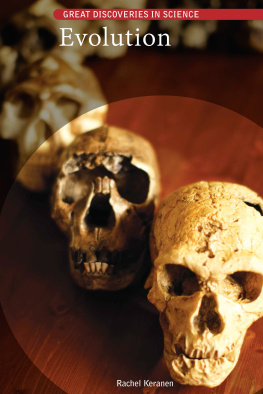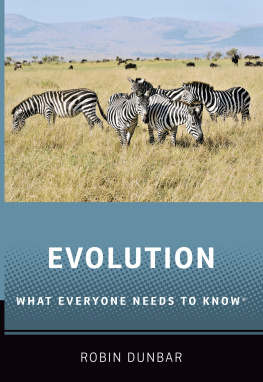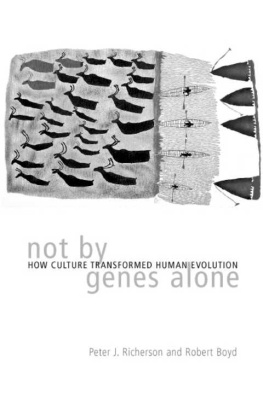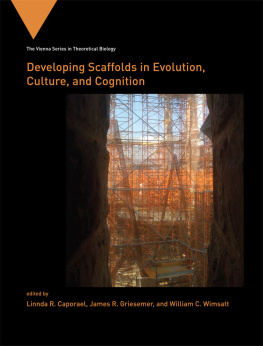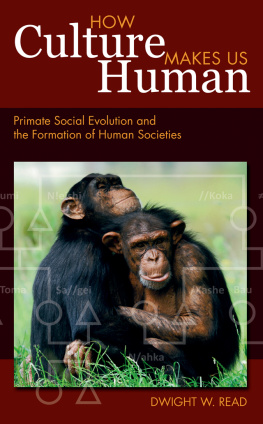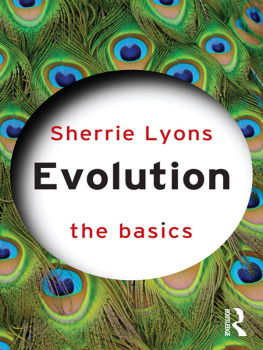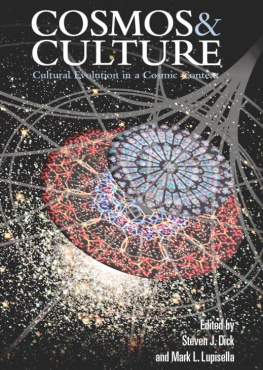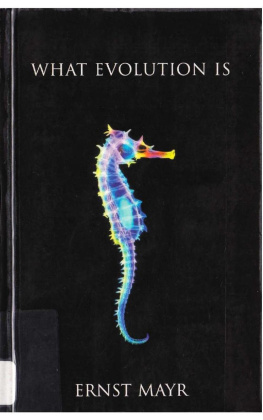

THE EVOLUTION OF CULTURE

The Evolution of Culture
THE DEVELOPMENT OF CIVILIZATION TO THE FALL OF ROME
Leslie A. White
Foreword by
Robert L. Carneiro and Burton J. Brown

Originally published in 1959 by McGraw-Hill Book Company, Inc., New York
First published 2007 by Left Coast Press, Inc.
Published 2016 by Routledge
2 Park Square, Milton Park, Abingdon, Oxon OX14 4RN
711 Third Avenue, New York, NY 10017, USA
Routledge is an imprint of the Taylor & Francis Group, an informa business
Copyright 2007 Taylor & Francis
All rights reserved. No part of this book may be reprinted or reproduced or utilised in any form or by any electronic, mechanical, or other means, now known or hereafter invented, including photocopying and recording, or in any information storage or retrieval system, without permission in writing from the publishers.
Notice:
Product or corporate names may be trademarks or registered trademarks, and are used only for identification and explanation without intent to infringe.
Library of Congress Cataloging-in-Publication Data
White, Leslie A., 1900-1975.
The evolution of culture : the development of civilization to the fall of Rome / Leslie A. White ; foreword by Robert L. Carneiro and Burton J. Brown.
p. cm.
Originally published: New York : McGraw-Hill Book, 1959.
Includes bibliographical references and index.
ISBN-13: 978-1-59874-144-5 (pbk. : alk. paper)
1. Civilization, Ancient. I. Title.
CB311.W55 2007
930.1--dc22
2007000279
Cover design by Joanna Ebenstein
ISBN 13: 978-1-59874-144-5 (pbk)
To the Memory of My Father
ALVIN LINCOLN WHITE
18661934
It is indeed hardly too much to say that Civilization, being a process of long and complex growth, can only be thoroughly understood when studied through its entire range; that the past is continually needed to explain the present, and the whole to explain the part.
Edward Burnett Tylor
Researches into the Early History of Mankind and the Development of Civilization, 1865, p. 2.
Contents
Robert L. Carneiro and Burton J. Brown
Leslie White (19001975) was clearly one of the leading anthropologists of the mid-twentieth century. We believe that he remains one of the most important and pivotal figures in the whole of anthropological history. White stood at the forefront of that small group of anthropologists who helped redirect anthropology from a cautious particularism to vigorous and far-ranging theorizing. He thus served to restore the discipline to its place among the generalizing sciences.
When White first entered the profession in the late 1920s, anthropology had fallen into the grip of the particularists, who had themselves fallen prey to a great skepticism as to whether anthropology could or even should attempt to formulate large ideas. They possessed a narrow concern with the factsa barefoot empiricism, Elman Service (1971:9) called it, reigned. The search for regularities and the erection of grand syntheses were carefully avoided.
Indeed, theory of any kind was not only suspect, it was openly disdained. To show how strongly this attitude prevailed, White was fond of quoting a passage from Berthold Laufer, a disciple of Franz Boas. I must confess, wrote Laufer, that I am in a state of mind where I would no longer give a dime to anyone for a new theory, but I am always enthusiastic about new facts (Laufer 1930:162). One of the authors to this foreword (Brown) calls this the Dragnet period in anthropology after actor Jack Webbs immortal radio and television catch phrase, The facts, Maam, just the facts.
What was true of theorizing in general was especially true with regard to the theory of cultural evolution in particular. Ignored by most anthropologists, it was dismissed out of hand by others. White again looked to Berthold Laufer to exemplify the hostility to it. Cultural evolution, Laufer said, was the most inane, sterile, and pernicious theory ever conceived in the history of science (Laufer 1918:90). Thus, when Leslie White became an anthropologist, cultural evolutionism found itself at a very low ebb: denounced by almost all and practicedlet alone championedby none. By the time White died in 1975, though, evolution had arisen from the depths, recaptured most of its lost ground, and become once more recognized as a major approach to the study of culture. And it was White himself, more than any other anthropologist, who was instrumental in this resuscitation.
Few persons outside the field of anthropology are fully aware that the concept of evolution, the guiding principle of so many of the other natural sciences, was for decades rejected and decried by cultural anthropologists. However, it was not always so. Propelled by the work of such men as Edward B. Tylor, Lewis H. Morgan, and Herbert Spencer, ethnology had begun its life with a strong evolutionary bent. Indeed, in the nineteenth century, evolutionary anthropology made many fruitful and enduring contributions to our knowledge of the origin and development of human societies. True, some of the early evolutionists did commit errors of the sort characteristic of any science in its pioneer stages. Morgans now-discredited theory that primitive promiscuity and group marriage had preceded monogamy in the history of human marriage was an instance of this.
By the middle of the 1890s, a movement had begun, led by Franz Boas, to expunge from ethnology those theories of the early evolutionists that, like Morgans views about the succession of forms of the family, had proved untenable. The movement, however, did not stop with pointing out errors. By the time it reached its high-water mark in the 1930s, antievolutionism had engulfed most of the profession. Almost universally, anthropologists had turned their backs on virtually every evolutionary formulation. Instead, they concerned themselves with the findings of their own fieldwork, with studies of distribution, diffusion, acculturation, and similar matters.
It is not well knownindeed, it seems anomalous in retrospectthat Leslie White was raised in this antievolutionary environment and for a time embraced its tenets. But, as he tells us in the preface of this volume, there came a time when he could not maintain his allegiance to this philosophy: The author absorbed the antievolutionary doctrines of the Boas School as a graduate student. But as he began to teach, he found, first, that he could not defend this point of view, and later that he could no longer hold it. White was being questioned and challenged by his students and discovered that he could no longer defend these antievolutionary doctrines against their criticisms.
It was during his three years of teaching at the University of Buffalo (19271930) that White began to turn against antievolutionism. But not until after he had been teaching at the University of Michigan, from 1930 on, did he totally change direction and begin a concerted effort to rehabilitate the theory of cultural evolution. The rehabilitation began in a modest way in 1939 with a paper read at the meeting of the American Anthropological Association and continued with an article published in the
Next page
